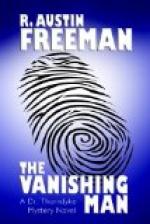Mr. Loram paused and looked helplessly at the witness; a suppressed titter arose from the body of the Court, and a faint voice from the bench inquired:
“Are you quite incapable of giving a straightforward answer?”
Miss Dobbs’ only reply was to burst into tears; whereupon Mr. Loram abruptly sat down and abandoned his re-examination.
The witness-box vacated by Miss Dobbs was occupied successively by Dr. Norbury, Mr. Hurst, and the cloak-room attendant, none of whom contributed any new facts, but merely corroborated the statements made by Mr. Jellicoe and the housemaid. Then came the labourer who discovered the bones at Sidcup, and who repeated the evidence that he had given at the inquest, showing that the remains could not have been lying in the watercress-bed more than two years. Finally Dr. Summers was called, and, after he had given a brief description of the bones that he had examined, was asked by Mr. Loram:
“You have heard the description that Mr. Jellicoe has given of the testator?”
“I have.”
“Does that description apply to the person whose remains you examined?”
“In a general way, it does.”
“I must ask you for a direct answer—yes or no. Does it apply?”
“Yes. But I ought to say that my estimate of the height of the deceased is only approximate.”
“Quite so. Judging from your examination of those remains and from Mr. Jellicoe’s description, might those remains be the remains of the testator, John Bellingham?”
“Yes, they might.”
On receiving this admission Mr. Loram sat down, and Mr. Heath immediately rose to cross-examine.
“When you examined these remains, Doctor Summers, did you discover any personal peculiarities which would enable you to identify them as the remains of any one individual rather than any other individual of similar size, age, and proportions?”
“No. I found nothing that would identify the remains as those of any particular individual.”
As Mr. Heath asked no further questions, the witness received his dismissal, and Mr. Loram informed the Court that that was his case. The judge bowed somnolently, and then Mr. Heath rose to address the Court on behalf of the respondent. It was not a long speech, nor was it enriched by any displays of florid rhetoric; it concerned itself exclusively with a rebutment of the arguments of the counsel for the petitioner.
Having briefly pointed out that the period of absence was too short to give rise of itself to the presumption of death, Mr. Heath continued:




